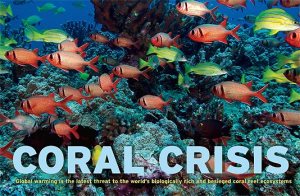Coral reefs all over the world are suffering severe damage from climate change, and as the levels of manmade greenhouse emissions continue to rise, the window of opportunity to save the corals are dwindling. According to a report published in the journal, Nature Climate Change, “approximately 70% of corals are expected to suffer long-term degradation by 2030, even if strict emission cuts are enforced”. Loss of the coral reefs would be devastating to the ecosystem because the corals are home to about 25% of the world’s ocean species. In addition to providing coastal protection, they support tourism and fishing industries for millions of people globally.
Scientists at the Potsdam Institute for Climate Impact Research at the University of British Columbia and the Universities of Melbourne and Queensland in Australia conduct studies on the impact of climate change on coral reefs. With the use of climate models to calculate the effects of different emission levels on 2,160 reefs worldwide, the researchers concluded that “[t]he rise of global average temperatures, warmer seas and spread of ocean acidification due to greenhouse gas emissions . . . pose major threats to coral ecosystems”. To protect coral reefs, sea surface temperatures must decrease greater than 2 degrees Celsius, which is the limit viewed as a safe threshold to avert most devastating effects of climate change—i.e., drought, sea level rise and crop failure. The study advises that a limit of the mean temperature increase of 1.5 degrees Celsius is needed to save at least half of the coral reefs.
A separate report issued last week notes the threat to the Caribbean corals and urged action to limit pollution and aggressive fishing practices. Average live coral cover is down to 8% today, compared to 50% in the 19070s as reported by the International Union for Conservation of Nature.
These research findings should serve as a wakeup call on the severely negative impact of climate change on our ecosystems. We need to act to save our environment while there is time. Let’s live green, be green.

